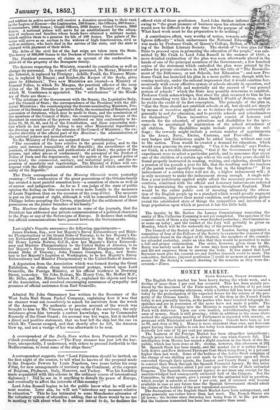A correspondent suggests, that "Lord Palmerston should be invited, on
the first night of the session, to tell what he knows of the proposal made to the Despotic Powers by Louis Napoleon, two years before his coup d'etat, for new arrangements of territory on the Continent, at the expense of Belgium, Piedmont, Italy, Hanover, and Turkey. Was his Lordship made acquainted with this scheme in the ordinary course of international diplomacy ? Did he see in it anything to disturb the peace of Europe, and eventually to affect the interests of this country ?"
Lord John Russell begins to let the public know what he will MOi do next session. Inter alia, he will not "introduce any measure relative to education." This he has intimated to some Manchester advocates of the voluntary system of education ; adding, that as there would be no use in meeting to talk about what he does not intend to do, he declines the offered visit of these gentlemen. Lord John further informs owing to "the great pressure of business upon his attention a would now be difficult to fix any time for the purpose of se What hard work must be the preparation to do nothing !
A contributive effart, very worthy of notice, towards solv
tit ligious difficulty" which embarrasses the National Educa • was made by Professor Craik, of Queen's College, Belfast, at a ing of the Belfast Literary Society. The sketch of "a true plan fel' State to proceed upon in promoting the education of the people," was sub- mitted by Mr. Craik to Lord John Russell in the summer of 1846; a more detailed explanation of the plan was soon afterwards placed in the hands of one of the principal members of the Government ; a few hundred copies of the statement which embodied the plan were printed by the author for private circulation in 1847, under the title of "The Reconcile- ment of the Difference, or not Schools, but Education " ; and now Pro- fessor Craik has launched his plan in a more public way, though with be- coming modesty, under the rational impression that it would combine har- moniously with every effective system of schools already in operation, and would also blend with and materially aid the success of "any general system of schools" which the State may possibly determine to establish. Professor Craik acknowledies, that since the plan occurred to him he has found something very like it in Adam Smith's Wealth of Nations, so that he yields the credit of its first conception. The principle of the plan is, "that the State should not establish schools at all, but should act simply by means of incentives applied so as to induce the people universally or generally to seek for education, and to provide schools and schoolmasters for themselves." These incentives might consist of honours and rewards for the educated, of privations and disabilities for tho igno- rant—to be ascertained by registration of the school attendance of all children. The disabilities might include privation of the suf- frage ; the rewards might include a certain number of appointments in the Army, Navy, Excise, Customs, and Post-office. Hono- rary badges and distinctions might be added largely, without any cost to the nation. Thus would be created a demand for education, which would soon generate its own supply. "Can it be doubted," says Profes- sor Craik, in a forcible illustration "that if the Government by way of experiment were to select a particular parish, and to announce that every one of the children of a certain age who at the end of five years should be found properly instructed in reading, writing, and ciphering, should have a pension of ten pounds a year for life, that the teaching and the teachers of the parish would speedily become the best in the kingdom ?" If an inducement of a certain force will not do a higher inducement will ; it is only necessary. to make the inducement' strong enough. A single mil- lion a year judiciously applied might afford the necessary pecuniary in- centives, combined with the official and honorary inducements referred to, for maintaining the system in operation throughout England. That would be the entire public cost of insuring ultimately the educa- tion of the English people up to a standard which would greatly augment their comforts, improve their moral condition, and proportionately gather round the established state of things the sympathies and interests of a large population upon which at present it has but little hold.


























 Previous page
Previous page